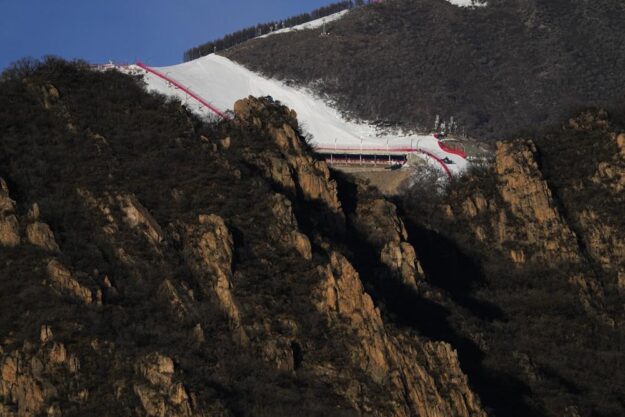Widgetized Section
Go to Admin » Appearance » Widgets » and move Gabfire Widget: Social into that MastheadOverlay zone
On the ground at cold, dry Beijing Olympics, Shiffrin mulls legacy, future of her sport

A ski slope at the 2022 Winter Olympics on Jan. 28 (AP Photo/Jae C. Hong).
Mikaela Shiffrin of Edwards is on the ground in China for the 2022 Beijing Winter Olympics, and, according to twitter, kicked off her first day of training Monday and reunited with her Norwegian boyfriend and downhill medal favorite Aleksander Aamodt Kilde.

Shiffrin skipped speed events over the weekend in Garmisch, Germany, and didn’t give up much ground in the overall World Cup chase, although Sunday’s super-G co-winner, Federica Brignone of Italy – the overall winner two seasons ago — did jump up to third in the hunt at 772 points.
That’s still a good distance behind second place (and last season’s overall winner), Petra Vlhova of Slovakia (1,009 points) and current leader Shiffrin (1,026) with just four World Cup events after the Olympics. Vlhova also sat out the Garmisch speed events.
Why risk injury in the disciplines she and fellow tech standout Shiffrin excel in the least, even in the name of additional training and experience before the Games (Shiffrin wants to compete in all five alpine events in Beijing)?
After all, top American downhiller Breezy Johnson now has to sit out Beijing after a recent crash and knee injury, and defending Olympic downhill gold medalist Sofia Goggia, of Italy, is very banged up heading into the Games after two recent crashes.
The historical stakes are huge for Shiffrin, who can break the three-way record for the most American gold medals in alpine skiing and has an outside shot of tying or breaking the record for the most American alpine Olympic medals of any color.
“I’m really expecting [Shiffrin] to get a medal in every event that she competes in, because she absolutely has the capability of doing that and that’s a compliment,” retired former Vail resident and 2010 Olympic downhill gold medalist Lindsey Vonn told Reuters in a recent interview. Besides that downhill gold, Vonn also won two Olympic bronze medals.
Only three American alpine ski racers have won two Olympic gold medals during their careers. Former Vermont, Aspen and Mammoth resident and environmentalist Andrea Mead Lawrence (slalom and giant slalom in Oslo, Norway, in 1952); Ted Ligety (2006 Torino, combined, and 2014 Sochi, GS); and Shiffrin (2014 Sochi, slalom, and 2018 Pyeongchang, GS).
Shiffrin also earned a silver medal in the combined in Pyeongchang, and so three more medals in Beijing would tie Bode Miller for the most American alpine Olympic medals in a career (Miller collected six total, one of which was gold).
While this is Shiffrin’s third Games, it took Miller four Olympics to pick up his six medals (2002-14), and he nabbed the last one at Sochi at age 36 – a record for oldest alpine medalist. Shiffrin, at those same Games, set the record as youngest woman to win slalom gold at age 18.
Just 26 at these Games, Shiffrin will be 30 at the 2026 Cortina Winter Olympics and 34 wherever the 2030 Games are held – possibly on home-country snow in Salt Lake City, Utah.
Shiffrin’s also just one Olympic medal of any color away from tying Julia Mancuso’s American women’s mark of four, including one gold in GS at the 2006 Torino Winter Olympics.
The women’s all-time record of six total Olympic medals is held by Anja Parson of Sweden — just one gold, over three Olympics — and Janica Kostelic of Croatia, who won four golds, six total, over three Olympics. Kjetil André Aamodt of Norway holds the men’s record with eight Olympic medals, four of them gold. Should she win two gold medals, as Mead Lawrence did in 1952, Shiffrin would match that mark.
But Shiffrin knows that with such records in reach there’s a great deal of expectation from fans and then pressure on her to perform. She recently spoke to the Associated Press about those pressures.
Battling back from back injuries, catching COVID, pandemic disruptions and the accidental death of her father the last two seasons, there’s no doubt at least one more Olympic gold would likely be Shiffrin’s sweetest success, landing her legendary status as the only American ski racer to ever win three golds.
When Mead Lawrence won two golds in 1952, it was a different era in ski racing – pre-World Cup and not nearly as globally competitive. Still, Mead Lawrence rode that success to some notoriety as an environmental activist.
Shiffrin’s singular focus on just ski racing has served her well over the years, helping her to reach the top step of the World Cup podium 73 times at a very young age. That’s just nine wins behind the all-time women’s mark set by Vonn (82) and 13 behind men’s record-holder Ingemar Stenmark of Sweden (86). Shiffrin is also trying to tie Vonn’s American record of four overall World Cup titles.
Ligety, a recently retired Shiffrin contemporary who also collected two Olympic golds, will be a commentator for these Games and is an outspoken advocate for mitigating against the worst impacts of climate change and has been for years. He’s an athlete member of the activist group Protect Our Winters (POW).
Initially reluctant to step outside of her intense ski focus and address bigger issues, Shiffrin in recent years has shown a higher level of consciousness when it comes to societal issues and environmental concerns.
Last spring, in an interview with CNN Sport, Shiffrin threw some shade on the International Olympic Committee’s pick of Beijing for these Games, saying, “You certainly don’t want to be put in the position” of choosing between “human rights and being able to do your job.”
Asked if she thought the IOC should consider such complexities in picking host cities, Shiffrin said: “I do, and I’m not in the room. I wish that I could be in the room where it happens, but I’m not, so I don’t want to make light of the decisions that those committees do have to make.
“I doubt it’s an easy job, but it feels like there could be more consideration when you’re hosting an event that’s supposed to bring the world together and create hope and peace in a sense. It could maybe be used in a better way. It’s almost like a power that they have to decide where we go, and some places seem more fitting than others.”
At the beginning of the current World Cup season, RealVail.com put a question to Shiffrin via a U.S. Ski and Snowboard Team spokeswoman about climate change, China burning more coal than all other countries combined, and human rights abuses, with Muslim minorities in forced cotton and clothing industry labor camps. The USSA spokeswoman replied:
“Mikaela will not be speaking to these issues tomorrow [Friday, Oct. 15], or heading into the Games. Her focus, at this point, is on athletics and qualifying to get to the Games at all. Yes, athletes have a platform and when they feel it is appropriate for them to use that platform to discuss larger issues, they will. That’s not for us to address as an NGB [national governing body] or as an aspiring medalist for the Beijing 2022 Olympics. With the new season just around the corner, and the Olympics on the horizon, our collective focus is 100% on athletics and performance as we head into the 2022 Olympic Games in hopes that we are able to represent our country well.”
But in an Associated Press story on Monday, Shiffrin had this to say: “I’m worried about my sport’s future but, really way beyond that, just worried about our all our futures and how much time we have before it all truly catches up with us. Sometimes I seriously consider just giving up races for the reason that it’s one less plane ride to take. That would be a small contribution to a huge issue.”
In fact, the alpine ski-racing venues for the Beijing Games, where Shiffrin will go for the gold, appear to have been built in the middle of an ecologically sensitive nature preserve, according to a recent CNN report.
Here’s the schedule for the alpine events at the 2022 Beijing Winter Olympics, which can be watched on NBC’s Peacock:
Alpine Schedule
Thursday, February 3 – Men’s Downhill Training
Friday, February 4 – Men’s Downhill Training
Saturday, February 5 – Men’s Downhill Training
Sunday, February 6 – Men’s Downhill
Monday, February 7 – Women’s Giant Slalom
Tuesday, February 8 – Men’s Super-G
Wednesday, February 9 – Women’s Slalom and Men’s Downhill Training
Thursday, February 10 – Men’s Alpine Combined
Friday, February 11 – Women’s Super-G
Saturday, February 12 – Women’s Downhill Training
Sunday, February 13 – Men’s Giant Slalom and Women’s Downhill Training
Monday, February 14 – Women’s Downhill Training
Tuesday, February 15 – Women’s Downhill
Wednesday, Feb. 16 – Men’s Slalom and Women’s Downhill Training
Thursday, February 17 – Women’s Alpine Combined
Saturday, February 19 – Team Parallel Event


